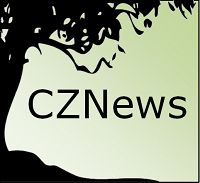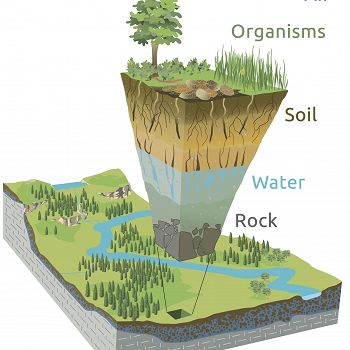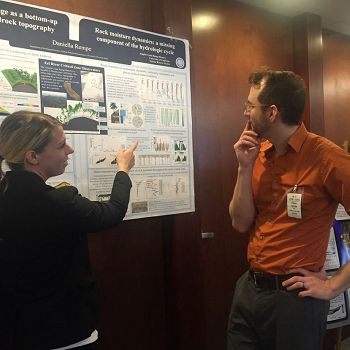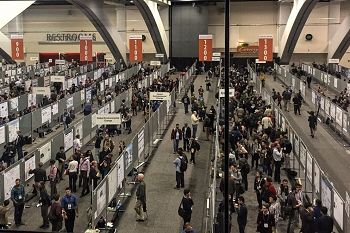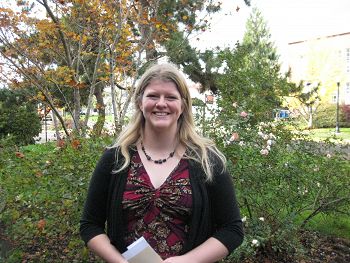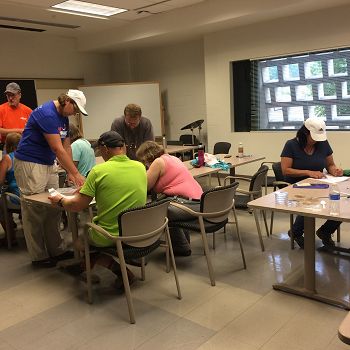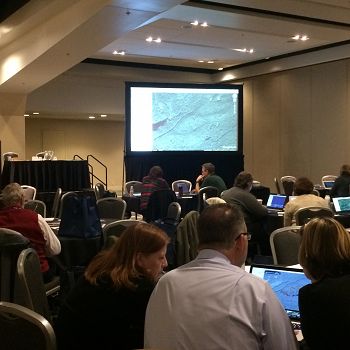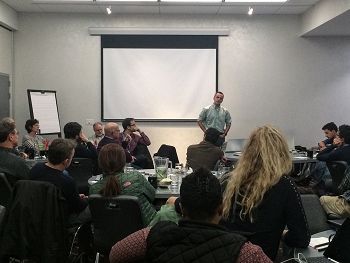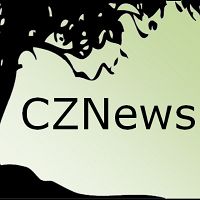CZNews: Winter 2017
Print Verison: CZNews - Winter 2017 (1 MB PDF)
NSF CZO Network Review
The U.S. Critical Zone Observatories (CZO) network review was held at the National Science Foundation (NSF) in Arlington, VA on November 14-15, 2016 hosted by NSF CZO program director Richard Yuretich. Attendees included CZO program PIs, National Office, Steering Committee members, early-career scientists, NSF program directors, and a 10-member review committee. PIs began with a synopsis of research accomplishments and education/outreach efforts of each CZO. William Dietrich (UC Berkeley) then presented CZO network accomplishments focused on interdisciplinary cross-CZO science. Presentations continued with CZO Education and Outreach by Tim White (Penn State), Structure and Management of the CZO Network by Lou Derry (Cornell), and the Vision for the Future by Susan Brantley (Penn State). The second day included a discussion with the review panel and a research symposium to feature the next generation of CZ science. 12 early-career CZ scientists, spanning CZO sites and disciplines, presented lightning talks and held a poster session on the influence of CZ science in their research and careers. We anticipate incorporating input from the review committee into discussions to be held at the CZO meeting in June 2017 (see below).
CZO Arlington Meeting
The U.S. CZO program will host a meeting open to the greater research community at the Hilton Arlington in Arlington, VA on June 4-6, 2017 with support from the NSF. The theme, "Critical Zone Science: Current Advances and Future Opportunities,” will focus the meeting on the latest CZ science results from the CZO Network and is designed to stimulate the community to formulate ideas for the future of CZO science. Collaborators both within the U.S. and abroad are invited. Our goal is to engage the Earth surface and environmental sciences community in discussing how CZ science will move forward into the future. Participants within and outside the CZO network are welcome, including participants from government agencies and nongovernmental organizations that are interested in developing better understanding of how Earth's surface environment will change into the future. We anticipate up to 150 participants. NSF support will be provided to cover some on-site and travel costs. For information on abstract submission, registration and accommodations as it becomes available, please visit our website CriticalZone.org or sign-up to receive information via e-mail here.
AGU 2016
Four members of our CZO community deserve congratulations for having been honored at the 2016 AGU Meeting in San Francisco. New AGU fellows included Mary Firestone (UC Berkeley), Michael Goulden (UC Irvine) and Gordon Grant (USFS). Ciaran Harman (John Hopkins U) received the 2016 Early Career Hydrologic Science Award for significant early-career contributions to hydrologic science. The CZO program held its annual booth in the Exhibit Hall, a Geophysical Information for Teachers (GIFT) Workshop, an annual breakfast with NSF, and presented >150 posters and presentations related to CZO science. A list of the presentations and posters is available at /national/news/story/czos-at-agu-2016/. More than 170 participants attended our town hall led by Susan Brantley (Penn State) and William McDowell (UNH), at which nine volunteers gave lightning talks on fundamental and societally-relevant science questions they felt should be investigated using an observatory. Issues presented included the depth of the CZ, incorporation of indigenous communities, and urban landscapes. Our Union Session, “The Critical Zone: Revealing the Structure, Function, and Evolution of Earth’s Living Skin,” included talks by William Dietrich (UC Berkeley), Steven Holbrook (UWyoming), Jennifer McIntosh (UArizona), Ying Fan (Rutgers), Amilcare Porporato (Duke), and David Beerling (USheffield). This session is available to watch on AGU On-Demand. We look forward to seeing you next year in New Orleans!
Upcoming Events
- GSA NE/NC Joint Meeting, March 19-21, Pittsburgh, PA
- SAVI International Scholars & Summer Interns proposals, Due March 13 & March 24, respectively
- NSTA National Meeting, March 30-April 2, Los Angeles, CA
- CZO Meeting “Advances and Opportunities,” June 4-6, Arlington, VA
- AGU-SEG Hydro-geophysics Workshop, July 24-27, Stanford, CA
CZO Spotlight: Rebecca Lybrand
Rebecca Lybrand, assistant professor in Crop and Soil Science at Oregon State University, teaches a Soil Landscape Analysis course that provides students with an understanding of spatial analysis in the context of soil science. As a former graduate student of the Catalina-Jemez CZO, she incorporates a CZO component to enhance interactions between undergraduate and graduate students as well as their abilities to communicate science across disciplines. Students begin with exploring CriticalZone.org to identify the CZO that best matches his or her own interests or background. The class then holds an “All-Hands Meeting” where students discuss their research experience, share applicable skillsets, and identify common interests to form 4 CZO groups. Throughout the course, Rebecca dedicates time after each lecture for groups to discuss how the course content applies to their given CZO site given climate, land-use history, and other characteristics. Then as a class, groups identify opportunities for cross-CZO collaborations. The course culminates with group presentations that synthesize class discussions, course readings, and an interview with a CZO scientist. Each student also writes a paper that explores one topic of interest from the class in the context of their selected CZO using data, papers, or other available information.
NGSS & CZ Science
The Next Generation Science Standards (NGSS) are K-12 science standards based on scientific and engineering practices, crosscutting concepts, and core ideas arranged in an interdisciplinary and inquiry-based approach to better prepare students for college. The CZO National Office’s current education efforts aim at providing professional development and curriculum materials applicable to the NGSS for K-12 educators. Don Duggan-Haas (Paleontological Research Institution) works to develop CZO virtual field experiences, an interdisciplinary inquiry-based approach around CZ science for students to discover why a place looks the way it does. In summer 2016, CZO RET Lauren Smith led a secondary education workshop at Penn State on using VFEs in the classroom and its application to the NGSS. This past December, Smith along with Duggan-Haas and Tim White (Penn State) gave a series of lectures on CZ science at the Pennsylvania Science Teachers Association conference. The CZO NO also led a Geophysical Information for Teachers (GIFT) Workshop at AGU 2016 entitled “The Shale Hills Critical Zone Observatory Virtual Fieldwork Experience: A Gateway to the NGSS's Three Dimensional Science.” Materials from this workshop and all other 2016 GIFT Workshops are available here. Duggan-Haas will present “The Critical Zone (CZ): Where Rock Meets Life and the NGSS Meets Your Class!” at the National Science Teachers Association (NSTA) National Conference in Los Angeles in April 2017. For CZO K-12 classroom activities and news, please visit /national/education-outreach/k-12-education-1national/.
2nd International CZO Workshop
The 2nd CZO International Workshop, funded by the CZO Science Across Virtual Institutes (SAVI) project, was held prior to the AGU Fall Meeting on December 11, 2016 in San Francisco, CA. This workshop revolved around three research themes that emerged from the first workshop held in December 2015, the theme of which was using common measurements at an international cross-site scale. The 3 research themes are 1) Concentration-discharge (C/Q) relations, 2) Carbon flux balances for soil organic matter (SOM), and 3) Measuring and predicting spatial variations in architecture (ARCH) of the CZ. The workshop began with a short introduction by Tim White (Penn State), presentations by theme working group leaders Jérôme Gaillardet (IPGP, C/Q), Tim Filley (Purdue, SOM) and Suzanne Anderson (CU Boulder, ARCH), and an introduction to the SiteSeeker tool on CZEN.org by Sarah Sharkey (Penn State). 45 participants then broke into working groups to develop a detailed work plan for implementing field or lab science, or data synthesis involving common measurements to address each of the themes. These work plans will lead to field or lab-based “campaigns” that involve the gathering of data at multiple CZOs internationally. Each working group has established a plan to move forward in 2017. If you are interested in participating with one of the working groups, please contact the group’s leader listed, Tim White or Sarah Sharkey.
CZNews
Receive the CZO Email Newsletter
Occasional email will include news, events, and other info related to Critical Zone Observatories.
We hate spam as much as you do, so your information will never be shared. You can unsubscribe at any time.
Daniella Rempe & Ciaran Harman during the poster session at the network review.
Hilton Arlington in Arlington, VA
View of poster hall at AGU 2016.
Rebecca Lybrand, Oregon State University
2016 Secondary Teachers CZO Workshop at Penn State
Don Duggan-Haas (CZONO) during GIFT Workshop at AGU 2016.
Adam Wymore presenting what the concentration-discharge (C/Q) relations working group discussed.
The Critical Zone. Illustration modified from Chorover, J., R. Kretzschmar, F. Garcia-Pichel, and D. L. Sparks. 2007. Soil biogeochemical processes in the critical zone. Elements 3, 321-326. (artwork by R. Kindlimann).
News Category:
EDUCATION/OUTREACH
Explore Further
